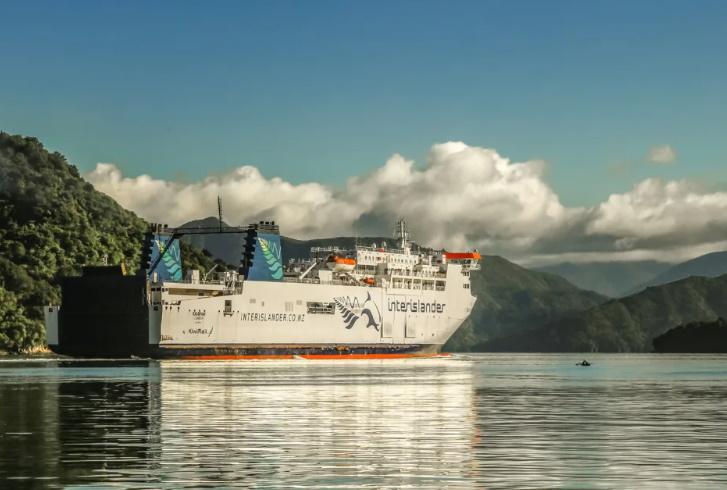Tens of thousands of people could be in line for compensation from KiwiRail, after a Commerce Commission investigation found it misled customers and may have breached the Consumer Guarantees Act in the aftermath of 2023’s catastrophic ferry cancellations.
The commission launched an investigation following complaints from people who had been refused compensation after cancelled sailings of both the Kaitaki and Kaiārahi ferries – which stretched over weeks and months – including the cost of accommodation, flights and even having to abandon cars on either side of the Cook Strait.
The commission investigated three incidents:
- A loss of power on the Kaitaki (28 January to 4 March 2023)
- A heat exchanger issue on the Kaiārahi (February 2023)
- A gearbox issue with the Kaitaki (4 March 2023 to 12 April 2023)
At the time, KiwiRail denied compensation requests and made statements which the commission found were likely to mislead consumers about their rights.
KiwiRail told customers it was not liable for any loss caused by cancellation or delays regardless of the circumstances, which may have prevented people from requesting refunds they were entitled to under the Consumer Guarantees Act, a likely breach of the Fair Trading Act, said Commerce Commission spokesperson Vanessa Horne.
KiwiRail also denied other claims on the basis that mechanical breakdowns were beyond its control, which also mislead consumers, the commission found.
It later accepted that at least one of the mechanical breakdowns could have been prevented.
In September, the company paid $432,500 after being found guilty of exposing passengers to risk when the Kaitaki ferry lost power with more than 880 people on board.
The Transport Accident Investigation Commission’s (TAIC) 2023 interim report found the complete engine failure which caused the Kaitaki to drift dangerously close to rocks near Wellington Harbour was caused in part by KiwiRail’s failure to replace safety-critical parts, which were years past their use-by dates.
Horne said Kiwirail has now made legally binding commitments to compensate all those affected, re-evaluate previous claims for compensation and update its policies and terms and conditions to make sure they are in line with consumer law.
The Commission can enforce the commitments in court if KiwiRail does not comply with them, but Horne said there was “no reason to believe Kiwirail won’t do what it’s said its going to do. It’s already started processing those refunds”.
“These commitments will put money back in the pockets of affected consumers, and crucially, set out a more straightforward path for getting a refund when a ferry trip is cancelled,” Horne said.
It is not clear how many people will be in line for compensation, Horne said, but given the extended periods the ferries were out of service, it could be “in the thousands” and the agreement also applied to freight customers.
She said the total amount of compensation Kiwirail has to pay could be extensive, as it will go well beyond the cost of the ferry ticket and could include flights, accommodation, rental cars and even costs for boarding or transporting pets.
“I suspect there’ll be some fairly significant claims, and some consumers that have probably had to make different decisions over the past couple of years because they haven’t been able to get this money back.”
Kiwirail will contact ticket holders and will be putting information on its website about how people can lodge claims and what evidence they will require, Horne said.
She said Kiwirail has also agreed to make changes to its policies so customers will be entitled to refunds on future delays and cancellations caused by mechanical faults without an obvious cause.
“What they’ve said is that their initial statement will be that it was within their control, so they will offer refunds to consumers. It may be that further down the line, they determine it wasn’t within their control, it was just something that happened and they couldn’t do anything about it, but consumers will have already received their refund, which is great.
“This was especially important for us as it will give consumers more clarity about their rights if delays and cancellations happen. It can be confusing and stressful to have travel plans cancelled and knowing what you’re entitled to can help ease that anxiety,” Horne said.
Horne said despite the fact that the Consumer Guarantees Act and the Fair Trading Act “have been around for a while”, the commission does find “lots of companies and businesses don’t get it right, especially when they are changing their terms and conditions, which was one of the situations here”.
In addition to the legally binding commitments, the commission has issued a warning letter to KiwiRail.
At least one passenger won relief through the Disputes Tribunal last year, which found the ferry was not “fit for purpose”.
In a statement, a Kiwirail spokesperson apologised for the disruptions and “for the delay in putting it right”.
“We have fully cooperated with the commission and acknowledge that we could have done better by our customers in the early part of 2023 and need to do better by our customers going forward,” they said.
“The Interislander ferries are New Zealanders’ ferries. Our passengers are the heart of our service and we should have done better in 2023.”
Last month, Minister for Rail Winston Peters announced a new deal for replacement ferries, which he said would be in service by the end of 2029.

